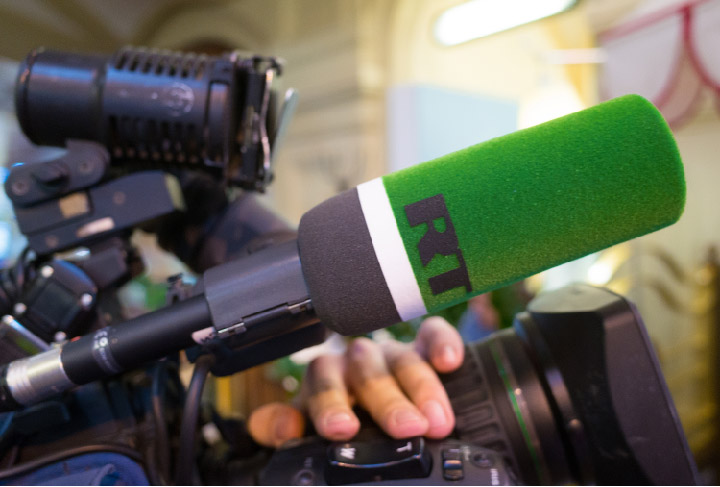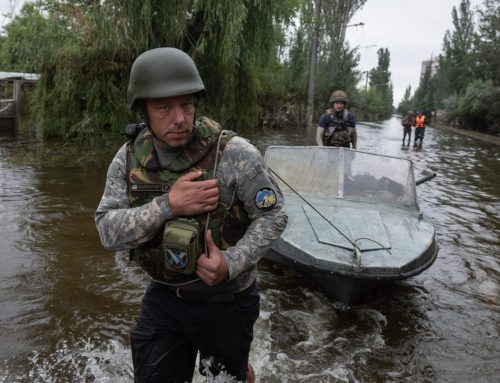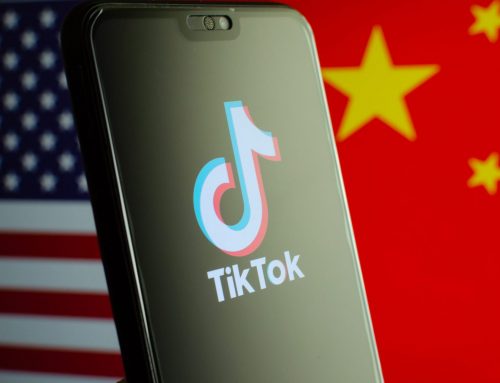Russia
Russian officials and state media continued their messaging push around the United Nation’s Climate Change Conference, making the meeting’s abbreviation, COP26, the most used hashtag last week by Moscow-linked accounts monitored on Hamilton 2.0. Russian diplomats circulated talking points from President Vladimir Putin’s virtual address to the conference, which set a goal for Russia to be carbon-neutral by 2060. Meanwhile, left-leaning state-backed outlets condemned Western leaders for using the conference as a photo op, blamed the U.S. “war machine” for driving global warming, and called for developed states to allocate climate reparations to developing nations. State media also amplified critical statements from climate activists, citing Greta Thunberg’s calls for greater climate commitments dozens of times over the past week. The Twitter account for the RT America show Redacted Tonight argued real change would be “won by passionate rebels taking over city streets.”
Russian diplomats and Kremlin-funded media also pushed back on reports of a Russian military buildup near the Ukrainian border. Russian Foreign Ministry Spokeswoman Maria Zakharova accused U.S. media outlets of launching a “full-blown fresh fake campaign,” filled with “panic attack-imbued materials” about the troop movements. Zakharova mentioned Politico reporters by name, noting that their article included images of tanks outside the city of Yelnya, which is not on the Ukrainian border. One Russian ambassador said the Politico piece was “a case of geographical ignorance.” The Politico report mentions the tanks’ location in Yelnya, while highlighting the equipment’s irregular movements. Russian diplomats also attempted to place the blame on Ukraine, denouncing Kyiv’s attempts to “drag Russia into forceful actions.” Sputnik and others noted that the Pentagon was monitoring the Russian military’s “unusual activities.” There was limited coverage of CIA Director Bill Burn’s trip to Moscow to discuss Ukraine and other points of U.S.-Russian tensions.
As usual, coronavirus-related terms were among the most mentioned phrases by Russian government-backed messengers. The Sputnik V vaccine’s account celebrated multiple studies last week, including one that found the Russian-made vaccine to be the world’s “1st COVID vaccine with proven efficacy for HIV-infected.” Sputnik V’s account also took several swings at Pfizer, claiming the pharmaceutical company is silencing bad press and that the decline of the Pfizer vaccine’s efficacy over time could be behind a surge of infections across Europe. State media also shared videos of protests in Ukraine, France, Italy, and Germany. RT highlighted the booming market for false vaccine cards.
Russian state media last week paid little attention to the escalating crisis manufactured by Belarusian troops escorting migrants to the Polish border. While independent media outlets increased their coverage of the crisis over the weekend, Moscow-backed outlets only offered a handful of posts on the topic, some of which blamed Poland for escalating tensions with Belarus.
China
Last Tuesday, Elon Musk tweeted a classic Chinese poem, ostensibly alluding to humanity’s shared oneness. This tweet was the most shared piece of content last week by the Chinese diplomatic and state media Twitter accounts monitored on Hamilton 2.0. While the Chinese ambassador to Lebanon thought Musk’s tweet offered a good plug for Chinese Communist Party (CCP) talking points, the Global Times and CGTN affiliate T-House asked whether the billionaire could in fact have been referring to “the Taiwan question?” The Chinese propaganda apparatus found further use for Elon Musk’s Sinophilia in the context of COP26, as an excerpt from an interview in which he positively compared China’s climate efforts to those of the United States was shared by diplomats and state media alike. In addition, a CGTN segment about the tweet was the most viewed Chinese state media video on YouTube last week. The second most viewed video featured pro-CCP British YouTube influencer Jason Lightfoot, a CGTN regular, lamenting the Western media’s alleged vendetta against him.
The COP26 conference in Glasgow was also among the most mentioned topics by both Chinese diplomats and their state media colleagues last week. Their comments around the conference could be broadly divided into two camps: promoting China’s climate achievements and criticizing the West’s climate hypocrisy. For example, China’s Assistant Minister of Foreign Affairs Hua Chunying highlighted massive renewable energy programs in China, while the Chinese ambassador to the United States extolled China’s green transport solutions. By contrast, China Daily’s Europe head highlighted European Commission President Ursula Von der Leyen’s private jet trip to the conference, as well as images of U.S. President Joe Biden and U.K. Prime Minister Boris Johnson seemingly asleep during meetings. CGTN also ridiculed a New York Times’ opinion piece calling out Russia and China’s presidents for their absence at the conference. In addition, diplomats with the Chinese Foreign Ministry asserted that Western democracies were the world’s largest pollution over the past 200 years, and the Chinese ambassador in Cuba quoted a John Kerry piece to demonstrate that China is the world’s true climate champion.
On November 2, China’s Ministry of Commerce issued a notice that encouraged families to stock up on daily necessities ahead of winter (most likely in anticipation of coronavirus-related lockdowns). This prompted panic buying and sparked online fears about war with Taiwan. While domestic Chinese propaganda outlets sought to quiet speculation of a Taiwan conflict, diplomats and state media maintained a stern line, with the United States identified as the main culprit in ongoing tensions between the island and the mainland. Relatedly, the first official trip to Taiwan by a delegation of members of the European Parliament made Chinese diplomats and state media predictably irate. Finally, following a Pentagon report that estimated that China may have up to 1000 nuclear warheads by 2030, some Chinese state media employees explained that the nukes were purely defensive and therefore not a cause for concern.
Iran
The main story in Tehran-backed media last week concerned disputed events surrounding the seizure of a Vietnamese oil tanker by the Iranian Revolutionary Guard Corps (IRGC). The Iranian Embassy in Venezuela shared an Iranian news broadcast on Twitter captioned, “The disastrous defeat of the pirates of the Caribbean in the Persian Gulf. American piracy in the Sea of Oman to steal Iranian oil resulted in an embarrassing defeat with a resounding response from the Iranian Navy. Stay tuned for more news about it.” An hour later, the embassy explained the situation somewhat differently: “A few months ago, the US stole an Iranian tanker with the captain’s betrayal. According to the disseminated news, the same tanker with the same captain who were under the protection of the US army, has been detained by the Iranian Navy. Traitors will be punished.” Press TV covered the story heavily on November 3, issuing dozens of tweets describing an evolving story, including: “BREAKING: Iran says U.S. fails to steal its oil at Sea of Oman; “Abortive act of piracy: IRGC Navy foils US attempt to steal Iranian oil in Oman Sea; “Oil minister thanks IRGC forces for rescuing Iranian oil from American pirates;” and “Photo shows IRGC commandos standing dauntlessly in front of the American destroyer during a successful operation that foiled US attempt to steal Iranian oil in the Sea of Oman.” Since November 4, Iranian press have reported much less on the ship seizure, except to cover comments by an Iranian lawmaker that Iran reserves the right to sue over what it claims was an “abortive act of piracy.” U.S. sources painted a very different picture to the Washington Post, which reported on November 4 that a Vietnamese vessel called the MV Southys was seized by the IRGC on October 24 and that USS The Sullivans observed the incident but did not intervene. Meanwhile, the drama generated substantial interest among pro-Iran Twitter personalities, who parroted Tehran’s claims that Iran took back the tanker that had been “stolen” by “U.S. pirates.”
The views expressed in GMF publications and commentary are the views of the author alone.








